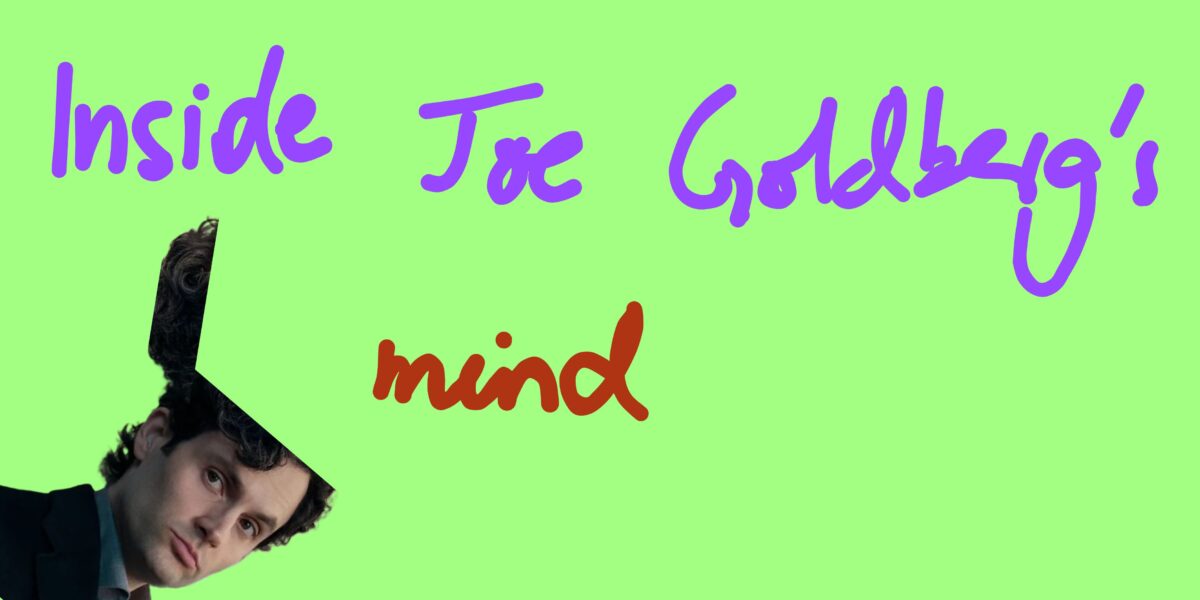Joe Goldberg, the infamous protagonist of Netflix’s You, has captivated and horrified audiences with his chilling charm and obsessive pursuit of love (to put it mildly). But underneath Joe’s excessive behaviors (mostly stalking, killing, manipulating) lies a psyche shaped by trauma.
By looking at Joe’s beliefs about himself, others, and the world, I hope to show what really drives him—and how his inner world plays out in the events of the show.
Joe’s Beliefs: A Cognitive Triangle
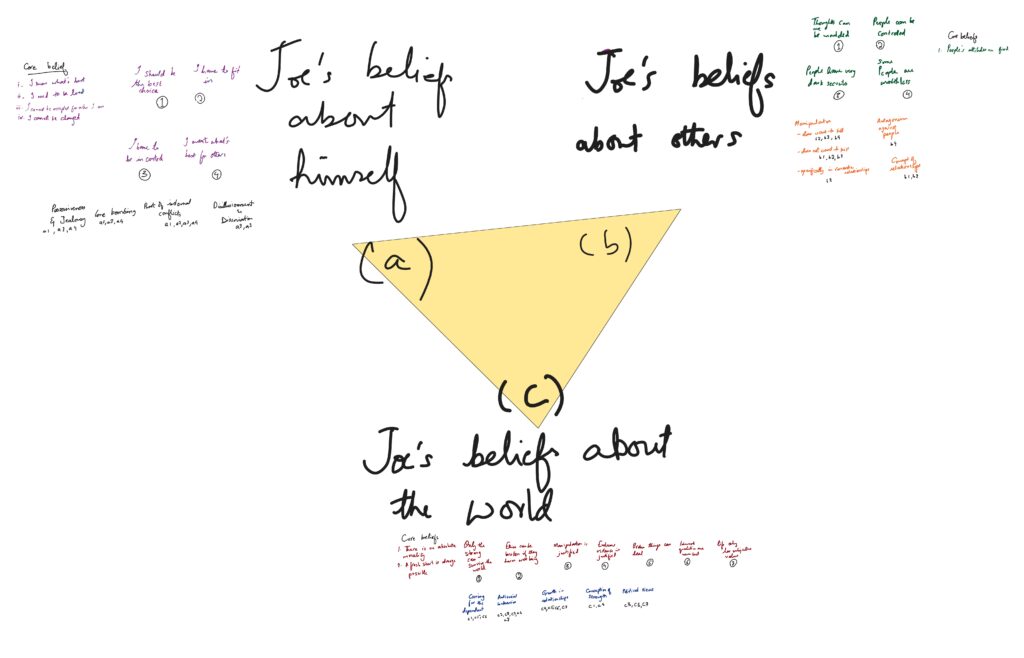
Psychologists often describe beliefs in three categories:
- Beliefs about self
- Beliefs about others
- Beliefs about the world
Let’s apply this model to Joe’s actions in You.
Beliefs are divided into two further categories:
- Core beliefs are central to Joe’s concept of himself, others and the world.
- Intermediate beliefs on the other hand are more specific beliefs related to situations. These beliefs guide Joe’s thoughts in more specific settings and situations.
1. Joe’s Beliefs About Himself
Let’s first look at the assumptions or intermediate beliefs of Joe Goldberg.
Intermediate Beliefs
“I should be the best choice.”
This exhibits Joe’s desire to be the one the other person always chooses – often regardless of who that person might consider to be better. The most prominent example is when he confronts Benji, Beck’s problematic (ex)boyfriend.
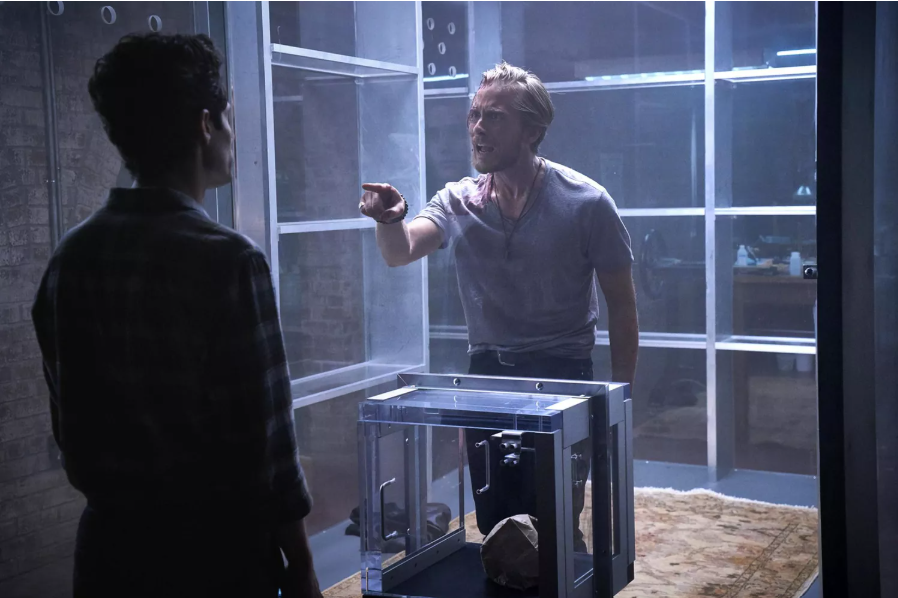
Joe believes himself to be better than most others. That’s why he is the better choice. And when there are indications that he isn’t ‘better’, he dissociates. An example here is of how Joe pursues Beck – even without being completely aware of it after they break up.
“I have to fit in.”
Joe dislikes sticking out of the crowd too much. This is why he decides to stop his usual ways of violence after the birth of his son. Even before that, he uses disguises to mask his appearance many times.
He also comes up with an elaborate lie, faking his identity, to the police officer in Season 1, Episode 6, when he drives to Peach’s (Beck’s friend) place. The lie wasn’t necessary but Joe does not want to give out any information that could compromise him.
This belief is also very evident when he aggressively reprimands Love after discovering that she has killed Natalie Engler in Season 3.
“I have to be in control.”
Joe is a control freak.
This is partly what a control freak who wants power would look like (amoral, possibly not immoral).
The whole point of killing people as a way of dealing with problems is that death would ensure that a chapter closes completely. Moreover, the glass box is structured in such a way that it allows the captor to view the individual inside from every direction. This makes it easier to monitor any anomalies and hence control the person inside.
“I want what’s best for others.”
Joe assumes that he knows exactly what is going to benefit others. This is a natural progression from his core belief that he knows what is best.
However, wanting the best for others also shows that Joe believes himself to be reasonably prosocial. This assumption is what often rationalizes Joe’s decisions while projecting his choices on to others.
Core Beliefs
“I know what’s best.”
Joe’s personal history with his foster father indicates that thinking various steps ahead is necessary to avoid and deal with repercussions of putting people in the glass box.
Having a father figure who is strict, cruel, narcissistic and isolating can ensure that the child would also have internalized beliefs regarding control, narcissism and perfectionism.
This can also show an underlying savior complex. This has been shown throughout the series with Joe trying to save his partner by dealing with issues (he probably has no business dealing with) by his own methods.
When he is questioned, he doubts the relationship, isolating himself internally from his partner.
“I need to be loved.”
This signifies a need-based belief. However, Joe’s need for love is satisfied following a love-hunt. This need also makes Joe prone to depression and existential crisis when there is no possibility of being loved. On the other hand, the love-hunt exhilarates Joe, as seen in his alertness and excitedness while stalking his love interest.
However, the belief of “I need to be loved” signifies ego-centrism, placing his own desires for someone over the well-being of others, quite clearly.
A very clear example is Joe’s disengagement with Love while pursuing Marienne.
Since the definitions of love can differ among people, at a certain point what was emotionally arousing for Joe might not be arousing for his partner. Individuals tend to have differing reactions, based on mood, lifestyles and personal history.
This was the case with Love and Kate. Both had differing personal history and lifestyle compared to Joe’s. But they also shared an overlap with Joe of having actually committed murders (or acts which led to loss of life) and being benefactors of influence that helped them remain legally fine.
In Joe’s mind, this made them good partners for him – at the time. However, while Love and Kate both commit crimes, they remain benefactors for different reasons. They did not enjoy the act of killing or being responsible for the killing.
Since Joe believes he needs to be loved, the rules have to be set by him. Kate, Love, Bronte and all of the other love interests of Joe have autonomy to do what they want – within the rules that Joe sets for them.
Example from the show:
Season 1 – Beck’s Storyline:
Joe becomes obsessed with Guinevere Beck not just because he finds her attractive—but because he needs her to validate his identity. He convinces himself he’s saving her from toxic friends, poor choices, and her own vulnerability. When she strays from this fantasy, he feels betrayed.
“I cannot be accepted for who I am.”
Let’s not forget that Joe was disciplined by his foster father, Ivan Mooney by being put into a cage every time he did something ‘wrong’. Suffice to say, this type of severe disciplining results in major qualms about one’s worth. Factor into it that Ivan Mooney seemed to repeatedly tell Joe that people like him were not accepted in society.
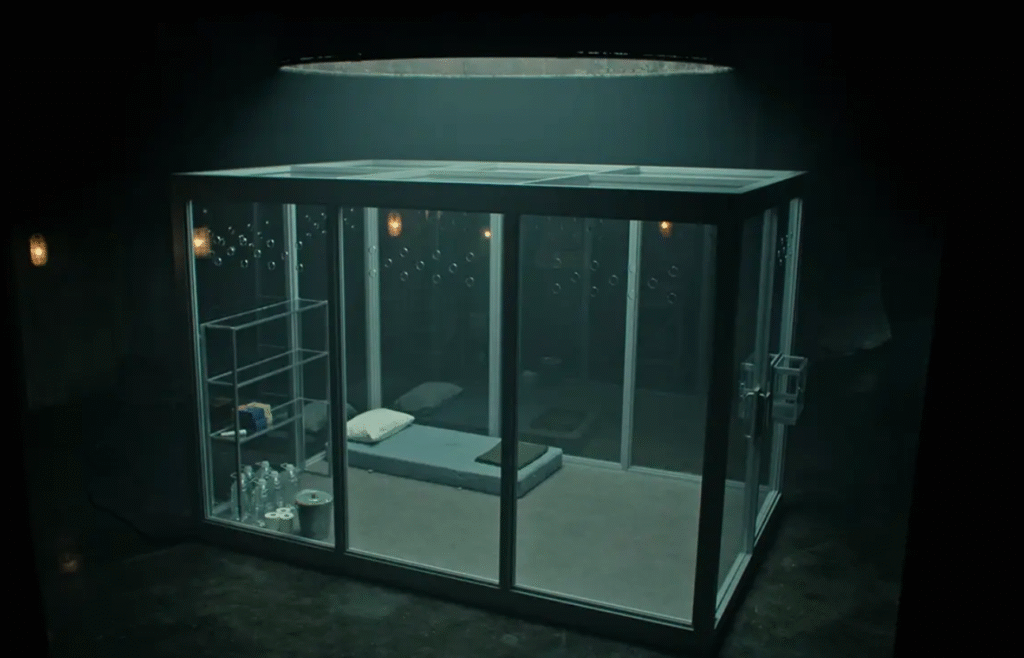
Such an intimate and traumatic connection with anyone can lead to identity diffusion – where an individual might start thinking that they are much like the person they are traumatized by. This further exacerbates Joe’s understanding that he cannot be accepted for who he is.
He experiences this crisis throughout his relationships. It is one of the key beliefs that drives his disillusionment with almost all his love interests.
“I cannot change/be changed.”
Most of us go through various alterations of our behavior and thought process. Consider, however, a person who had certain ‘rules’ practically beaten into them. That their identity is different from others.
This trauma can make a person feel separated from others. They can observe others – but they cannot be like them. In other words, many of the behaviors Joe saw around him were things that he probably agreed with, but his personal beliefs were his own and while his motivations might align with others for some time, he could not be like them.
Neither did he ever express a serious desire to align his identity with others for any reason other than to get what he wanted.
This shows up in how Joe’s thought process around killing people didn’t change. Neither did his understanding of how to connect with people more holistically – i.e accepting their flaws and differences between him and his love interests.
For example, instead of aligning himself closely to Love following their marriage, he is disillusioned by the mundanity of the relationship. He sees a therapist with her. He tries to connect to her. However, he also sees himself as fundamentally different from her with regards to her motivations for the family and his more personal relationship. Aside from showing his divide from others, this also shows his unwillingness to change for the marriage or for his son.
Thus, “I cannot change”.
2. Joe’s Beliefs About Others
Intermediate Beliefs
“Thoughts can be molded.”
Joe understands that thoughts are malleable. This is an assumption that enables – and facilitates – him to use manipulation in resolving conflicts. On the flip side, it also makes him nervous that others might mold the thoughts of people against him.
This is what often leads Joe to take aggressive action against people he feels threatened by. For instance, in Season 1, Joe is aware that Peach could possibly con
There is a positive aspect of this too. An example of this shows up in Season 2. Despite being opposed to Love’s friend Gabe Miranda trying to release his inner emotions, Joe still gives it a try. As a result, he does end up benefiting from it psychologically.
Similarly, Joe considers the benefits of therapy. While this might not have been his main goal for taking sessions with Dr. “Nicky” in Season 1, he appears to give marriage counselling with Love a genuine try in Season 3.
“People can be controlled.”
Joe believes that people can be manipulated into doing things he wants them to do. This belief is partly supported by the understanding that thoughts are malleable. It is powered by Joe’s own belief about himself – “I have to be in control.”
While he does end up killing a number of people, Joe’s procedure of controlling people is not exactly based on violence. Rather, it is based on manipulation. If the manipulation works, violence is not necessary. However, if it does not work, his methods increase in physical severity.
“Everybody has dirt on them.”
This is a central theme by which Joe makes his victims ‘exchange’ their freedom from the glass box with something that could incriminate them. It does work when the victim has skeletons in their closet. However, this belief is irrational as proved in the case of Delilah. She indeed did not do anything to incriminate her. Her death, thus, comes at a clear violation of Joe’s belief.
This belief is also seen in action when in Season 4, Goldberg seems to be deluded in that Rhys was guilty of killing people that Goldberg himself had killed. It shows a possible unconscious bias for his own belief that everybody has dark secrets, which allows Joe to pin his own crimes on someone like Rhys, who had no history of serious misconduct.
“Some people could be worth more, if they die.”
Joe assigns value to others’ utility (as we all do) to himself. However, he does so without actively engaging with the fact that some people who he assigns low value to could have similar goals to his. Instead, egocentrism, as reflected by his beliefs that he ‘knows the best’ and ‘wants the best for others’, makes him believe that his thoughts about someone else – conceived from a very short analysis thanks to his stalking – define the worth of someone else entirely.
If this person, in his personal opinion, provides no utility (social, emotional or economical) rather only conflict, Joe does believe that their death will fill his need for them being useful to his cause. This is a rationalizing belief for his act of killing people.
It is basically what guides – and allows – Joe to play judge, jury and executioner. Some examples are in Benji’s demise back in Season 1. In a positive light though, those who could prove their utility to him are often treated as friends.
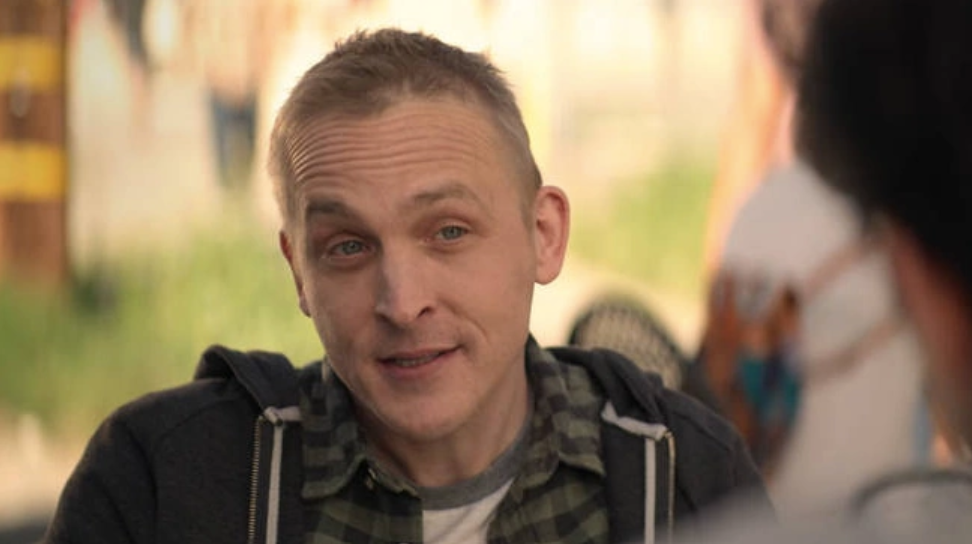
This is most evident in how he treats Will Bettelheim as a friend after Bettelheim helps him change his identity as a new person – after keeping Bettelheim as a captive.
Core Beliefs
“People’s attitudes are fixed.”
Joe’s worldview swings between idealizing people and seeing them as dangerous or disloyal. However, more than that, he seems to think that people cannot change. In some ways this is his own projection of how he is.
In his mind, he, himself, cannot change. Others cannot change either. They might evolve with time. But their attitudes will remain the same.
One might even say that the glass box Joe was disciplined in is the environment that he believes everyone is in, subconsciously; unfixed, unmoving and unforgiving.
This belief also explains what the concept of ‘love’ means to Joe. This is also what seems to attract him to a certain type of people. Mostly, people who feel trapped by their circumstances. On the other hand, Joe connects to people who seem to want to escape this cage.
While this attracts Joe to people like Beck and Kate, once they don’t escape his own predictions of how they behave, he either loses interest or sees them as another cage.
However, expectations not being met or people being too predictable is something very common in relationships. What makes Joe’s belief unique is that he judges the other person but he has already made a plan in his mind for escape. And he commits to that fully.
This is why the You after his marriage with Love becomes someone else completely.
So, this belief also plays a protective role for him while he is moving on. And so, he moves on to the next person – even after such an emotional rollercoaster of a relationship.
Examples from the show:
- Season 2 – Love Quinn: Joe initially sees Love as “the one,” someone who truly understands him. But when he discovers her secrets, especially that murder is a possibility she openly considers, his fantasy collapses.
- Season 1 – Peach Salinger: Joe sees Peach as a threat to his control over Beck, labeling her manipulative and predatory—even though he is the one stalking and killing. He tries to reason with her. However, the possibility of killing her stays with him throughout their interactions.
Attachment Pattern:
Joe projects his fear of abandonment onto everyone. He believes others will either harm him, control him, or leave him—so he acts first
3. Joe’s Beliefs About the World
Core Beliefs
“There is no absolute morality.”
Joe understands that there are injustices in the world. He understands that there is discrimination, prejudice and abuse.
And yet he does not seem to have a moral code that separates ‘bad’ from ‘good’, other than how useful someone is to him. He is definitely biased towards people who are nice to him and those he wants to protect. And he is biased against those who take advantage of him.
But Joe also almost ends up killing people who he related to earlier on (aside from his love interests). For example, Joe killed Edward in Season 4, who had practically done no harm to Joe other than investigating him with Nadia Farran. Moreover, there seemed to be no remorse in doing it. Rather, Joe killed Edward as part of a larger plan to get Nadia arrested.
This shows that to Joe, there is no absolute morality. While he does show hints of morality, there is no universal moral guide for his actions.
Joe’s lack of remorse while killing indicates his detachment from a moral code shared by the public at large. Many individuals with personality disorders feel a moral wall between themselves and almost everyone around them.
“A fresh start is always possible.”
Numerous times throughout the show, Joe seems to transition fairly easily into a new life. While life is transitional by nature, Joe appeared to dissociate, starting the season off as if it were another chapter.
Practically, not justifiably, Joe’s actions were measured. His plans had thought behind them – albeit with a very egocentric directive.
For example, in Madre Linda, Joe tries to create a normal life for his son Henry. But the pressure of perfection, judgmental neighbors, and his ‘toxic’ dynamic with Love push him into repeating old patterns.
Moreover, Joe tries to escape his past by becoming “Jonathan Moore,” a professor. Yet even in a new identity, he can’t trust the world to accept him. In some ways, his whole view on life seems to mimic fantasy.
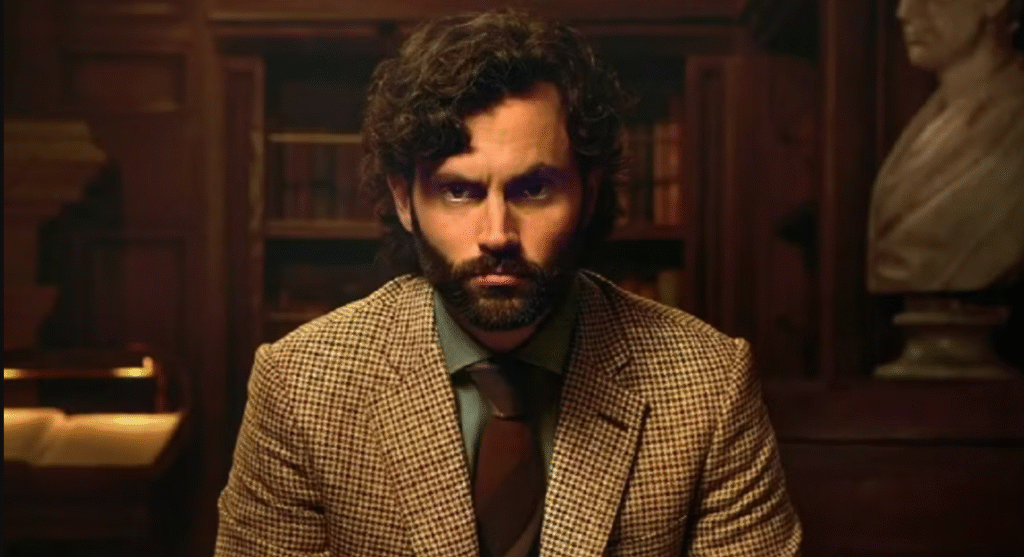
For example, Joe prefers idealized, imagined versions of people and love. Reality is messy – and dangerous. This is a common thought pattern in individuals with personality disorders.
Intermediate Beliefs
“Only the strong can survive the world.”
Joe’s foster father seems to have beaten the concept of being stoic and in control into him. During flashbacks of Joe’s own time in the glass box with his father as his captor, the father is seen as demanding the adolescent to accept the glass box as ‘home’.
So, Goldberg had to be strong, even if it came at the cost of extreme trauma.
During Season 1, he showcases this belief during his interaction with Paco, where he explains that even when his mother’s boyfriend was being abusive to her, he had to remain strong – but not stupid.
It shows how Goldberg’s concept of strength is not just physical – it is mental as well. This could be a largely rational and positive view of the world had it not been a partial justification for killing off people Joe viewed as weak or worthless.
“Ethics can be bypassed if they harm well-being.”
It is odd to understand that many people with psychopathic tendencies have some very functional views of the world. What differs them from people who are ‘normal’, however, is the degree to which they generally push the boundaries of what is morally permissible to them.
The belief that ethical boundaries can be broken if they harm well-being of not just Joe, but the people around him and the world at large, isn’t exactly psychopathic. However, it grounds Joe’s actions morally and allows him to not suffer from cognitive dissonance when he ends up murdering innocent people.
“Manipulation is justifiable.”
A need to control, and the beliefs that thoughts are malleable and that Joe knows what’s best all require a belief about the world which makes sense.
‘Manipulation is absolutely permissible’ is the belief that shows that Joe understands that people use this tactic frequently. And that it’s not that bad. Rather, because it could resolve conflicts, it is completely justifiable.
IF it’s Joe who is doing it. Because Joe knows what’s best for others and he always wants best for others. That’s what makes him have the right to manipulate and lie to others.
“Extreme violence is justifiable.”
Much like manipulation, extreme violence is also justifiable. He’s seen it in his childhood with how his father treated him and his mother. Albert Bandura’s famous Bobo doll experiment (read it here) provides ample evidence for how children could learn violence through observation alone. Goldberg has also seen people he idealizes – including his mother – abandon him.
Even more important in the formation of this belief is that Joe had already killed once in his childhood – his own biological father. Killing such a central figure in early childhood would have likely set his boundaries further away from others when it comes to violence.
“Broken relationships and people can heal.”
This is actually an example of a rational belief. It helps Joe seek marriage counselling in an effort to mend his relationship with Love. It also softens him towards people who require healing. Some prominent examples are of his friendships with Paco, Ellie and Delilah.
On the flip side, all his relationships were with partners who wanted to heal. He sought to provide them the best he could. However, with all the other irrational beliefs we have covered in this article, this belief is often fulfilled impractically. He violates major social norms and privacy, leaving behind a trail of destruction. This is common in individuals with borderline personality disorder (read about it more here).
“Inherited qualities are never bad.”
Suffice to say, Joe is neither a racist nor an ableist. He respects people who have faced marginalization by institutions and the public. In his first conversation with Marienne, he acknowledges his possible bias as a white man quite holistically.
Furthermore, he treats Dante, the blind librarian, warmly without ever rudely bringing up his disability. Rather, he trusts him with his child more than he does with his other friends.
“Life has subjective value.”
Whether someone is dead or alive depends upon the utility they have to offer Joe and his world. Since love could potentially more harm to Joe’s world, she had to go.
Hence, ‘life has subjective value’.
Important Areas of Conflict
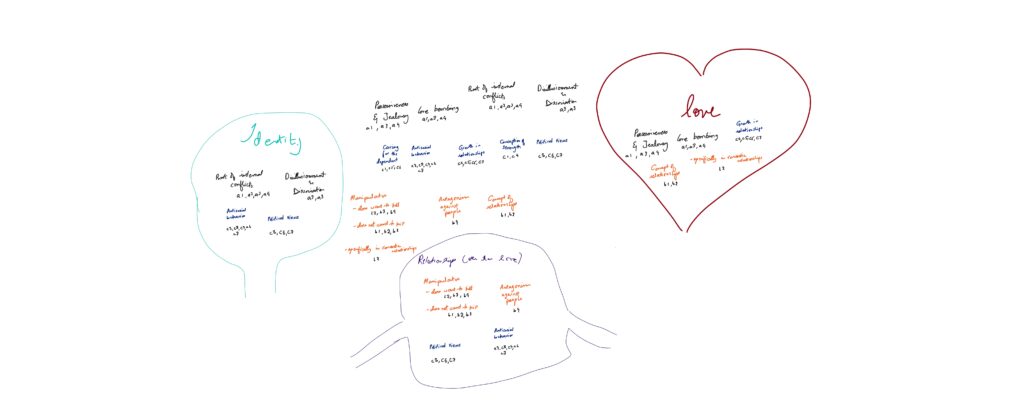
Splitting and Idealization (Borderline/Narcissistic Traits)
Joe’s tendency to idealize, then devalue, mirrors a splitting defense mechanism. It shows up most in relationships where he admires someone and the latter does something which rings alarm bells in Joe’s mind.
However, the validity of Joe’s mental alarm is pretty sketchy.
Rhys seems intellectually apt to Joe. Joe admires him – to the point of obsession. Joe experiences an elaborate state of (borderline) psychosis – possibly transforming into acute psychosis – in the absence of actually questionable actions or beliefs Rhys was committed to. In a way, Joe creates a negative side to Rhys which isn’t really there (of him being the eat the rich killer).
So, even in the absence of actual negatives, Joe manages to devalue Rhys based on made-up narratives.
This is understandable if we understand the reasonings of a person who is obsessed. Obsessions could lead to compulsive actions – often fixating the individual emotionally as well as psychologically on certain expectations of others or the environment. When these expectations aren’t met, it shifts Joe’s mind towards one end of rationalizing.
This issue is common in:
- Borderline Personality Disorder (BPD)
- Narcissistic Personality Disorder (NPD)
His quick switch from idolizing Beck or Love to harming them when they challenge his fantasy is also textbook ‘splitting’.
Attachment Trauma and Identity Diffusion
Joe’s obsession with “saving” others, adopting new pseudo-identities, and needing to be the perfect partner puts him into considerable internal and external conflict.
On the internal side, there is identity confusion. It is possible that Joe’s pseudo-identity in Season 4 contributed to him dissociating or experiencing acute psychosis that led him to kill a number of people. Perhaps, this is all one of the reasons why Joe kills Rhys.
Another conflict shows up in his concept of the family. Joe appears to be a caring father. However, he remains physically separated from Henry, his son, for his own personal reasons rather than for the well-being of the child. Here, adopting a new identity clashes with his belief of being a good father or ‘saving’ his son from a world without his father.
On the external side, Joe has clear signs of a disorganized attachment style. His tendency to romanticize others while manipulating them (because he doesn’t trust them to know what’s good for them) means that his style of attachment doesn’t include an acceptable, transparent pattern.
An acceptable method of attaching would be ‘pursuing’ them, asking them out, settling down with them and trying to concede or compromise where you can (taking responsibility of what you did right or wrong).
Instead, Joe’s understanding that he knows what’s best for others and his need for control makes him manipulate his partners where he sees fit. This places him in a far more powerful position – without the other person even knowing it. This indicates that Joe is deeply insecure.
Research also shows that personality issues are significantly associated with a disorganized attachment style.
Love and Identity in Joe’s Mind
Love, to Joe (possibly unbeknownst to him), involves control, obsession and conditionality.
Joe chases Marienne across continents, claiming he loves her. But when she refuses him, he traps her.
How he behaves following that is quite dramatic – probably something that Marienne would have felt that Joe would do. Nevertheless, he projects his need for control as a form of “protection.”
Joe doesn’t truly know himself. His identity constantly shifts based on who he’s with – whether it’s a bookstore manager, a father, or a professor. Each new persona has a similarity only to the extent that it helps him mask his actions – and the fact that he does like reading and fantasizes about certain roles.
This is the manifestation of superficial charm, as the persona he has put on lasts only in superficial relationships. So, the fact that he splits from over-valuing his partners – and others – to undervaluing them makes his affection seem dishonest and unstable to his partners – who are far less superficial in the depth of their feelings of love.
Stalking
‘Love’ does not necessarily involve stalking. This is the case even in the case of Joe being the one stalked by Love, in Season 3. It could be that Joe understood stalking as ‘charming’ – but only when the stalking is less intrusive. However, he understands the tendency for it to be intrusive. This is partly what disillusions him from Love.
Based on our attention to stimuli and certain instinctual reactions of the autonomic nervous system, stalking could lead to a feeling of paranoia. Joe stalked, himself – but never did he properly admit to it.
Stalking in itself has psychopathic leanings where an individual treats the one who’s stalked as an object of desire. Almost every one of us can do it. But it requires planning alone in pursuit of someone we made a contract to love – not possess.
This is the process of objectifying. It is commonly found in nature. Many organisms have evolved in order to be aware of someone ‘eyeing them up’.
Final Thoughts: Understanding Joe
Joe Goldberg is a disturbing character. He is also generally psychologically consistent. His violent behavior, manipulation, and self-justification all stem from unresolved childhood trauma, distorted beliefs and continued relationship trauma as he grew up.
In a way, You is not just a thriller – it’s a cautionary tale about what happens when core emotional wounds are ignored.
Here is a question though.
If Joe had received love, safety, and therapy – could he have turned out differently?
Joe Goldberg’s Personality Analysis
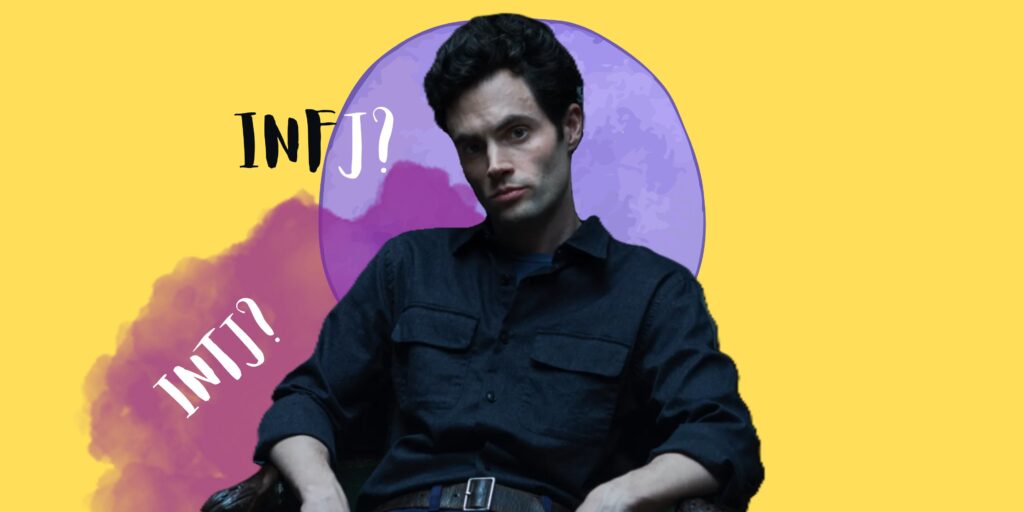
Joe has remained a one-of-a-kind depiction of someone who violates boundaries (and, as I mentioned, kills people) in his pursuit of love. What makes his depiction (played by Penn Badgley) great is a multi-dimensional view of how someone who stalks or commits crimes of passion can rationalize their behaviors as justifiable.
I explained Goldberg’s thinking and resulting behavior above.
Now in this section, I will explain Goldberg’s personality specifically through two theories:
- The Big 5 Personality Trait Theory.
- Jungian personality theory – measured through Myers-Briggs Type Indicator (MBTI)
So, let’s first look at Joe Goldberg through the OCEAN (Big 5) model!
Joe Goldberg’s Big 5 Personality Traits
From a clinical lens, Joe is a tangle of competing beliefs, trauma, need, and moral ambiguity. Combined, these traits make him compelling, disturbing, and difficult for the average person to categorize.
That’s one of the reasons why people tend to not realize who he really is!
Below is how his Big Five traits interact in complex ways, with both strengths, weaknesses, and internal tension.
Openness to Experience: High
Joe’s openness is among his more “positive-seeming” qualities. He has a deep love of books, of ideas, and is open to newer value systems.
He also experiences wonder (for example, the way he idealizes characters like Brontë, seeing the world through romantic frames when he’s in love or fixation – check out the lake scene in Season 5).
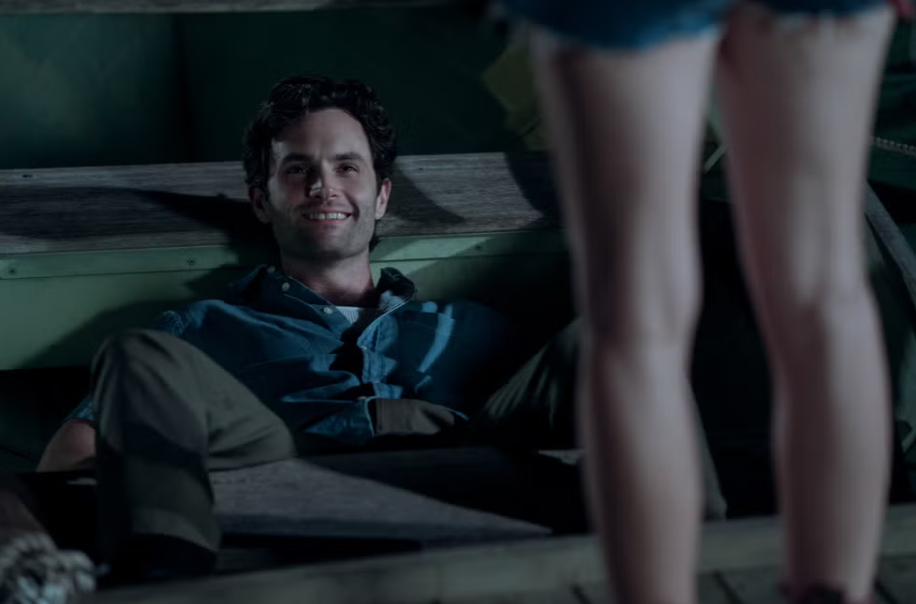
Plus, he’s tried different professions, moved across cities, been willing to change settings (sometimes to escape but sometimes to reinvent). One example of his openness to ‘change’ is how he even considers therapy with Love, which is an indicator of some willingness to explore inner life (btw, you should too!).
But this openness comes with cost.
It fuels his propensity to fantasize, to see people not as they are but as he wants them to be. When reality deviates, another one of his traits, neuroticism (explained in great detail further down this article) intervenes, leading to disillusionment – and sometimes rage (indeed people who are high in openness and neuroticism do tend to use immature defense mechanisms more).
There’s also a vulnerability: because he’s open to many experiences (love, beauty, connection), he suffers deeply when they fracture or betray his ideal.
Conscientiousness: Moderate
Contrary to some impressions, Joe’s conscientiousness is not uniformly high. He’s selective in where he invests discipline. Yes, he picks professions that allow him quiet, control, or flexibility. He maintains routines, covers up tracks when needed, plans, anticipates consequences. But much of this effort is in service of his own ends (control, security, love-hunting) rather than aligned with broader social or moral norms.
He lacks ambition in the conventional sense: big public goals, fame, upward status aren’t his drivers. This is what separates him from other psychopathic characters in TV such as Walter White or Hannibal Lector.
In fact, his lack of financial ambition or strife for power makes him an anomaly even with respect to psychological literature. Research notes that psychopaths are generally more preoccupied with attaining material success or gaining power. Goldberg does seem to enjoy power. However, he isn’t looking for social power as much as he prefers to directly control specific individuals he wants to. This is partly because he is introverted (explored further in the next trait below).
Morally, he is ambiguous – he rationalizes violence, murder, stalking as means to ends that, to him, are justified (“I know what’s best,” “I want what’s best for others,” “ethics can be bypassed”).
So, his conscientiousness is strong insofar as he cares about consistency with his own internal logic – but weaker in domains where that logic conflicts with external moral, legal, or relational demands.
Extraversion: Low to Moderate
Joe leans toward introversion: much of his life is solitary, operating behind scenes, avoiding large social circles. He picks jobs with less social exposure (except for his professorial detour); lives alone; isolates himself. Social blending isn’t his forte in bigger groups, especially when compared to characters who are more socially embedded.
This is most notable in how he does not seem to be as vocal or involved in with Kate’s bigger social circle in Season 4, as compared to Beck and Love’s more confined groups.
But this is not a simple low extraversion. He does pursue excitement: he seeks out specific people he finds interesting, he can charm, he can “turn on” charisma as needed. He is comfortable in one-on-one interactions, frequently talking his way into love interests’ lives or building more intimate relationships with people who he shares similarities with.
There’s a tension: between his need for solitude/control and his craving for connection and “being seen.”
Agreeableness: Moderate to Low
Joe’s agreeableness is compromised but not erased. His internal monologue is sharp, often critical of others. But he does agree with people even when it doesn’t outright serve his aims. For example, he can care for others’ autonomy as in the case of Dante and Paco. However, it does seem that he incorporates more from a utilitarian perspective (“if it helps my ends, or helps both of us”) than a purely empathetic one.
It is also important here to mention that Joe does seem to understand others’ perspectives on the level of thinking (aka cognitive empathy) rather than feeling (aka affective or emotional empathy). This shows up in how during his first interaction with Marienne Bellamy where he acknowledges the injustices faced by women of color but ends up (attempting to) deliberately killing her. Indeed, research also shows that people with the dark triad (psychopathy, narcissism and machiavellianism) do tend to lack in affective empathy but not necessarily in cognitive empathy.
He senses injustice, sees others’ suffering. He even sometimes attempts to help. There are also signs of loyalty, or concern (for example with Delilah, Paco, etc.), particularly toward those he forms a bond with.
At the same time, trust is scarce. He’s often wary of people’s motives or hidden flaws. He sets conditions (“you have to earn my trust”). He instrumentalizes kindness when it fits his goals but switches to manipulation or coercion when he feels betrayed or when someone doesn’t live up to his projected ideal. So, his agreeableness is conditional, contextual, constrained by his beliefs about control and his trauma.
Neuroticism: High
This is perhaps Joe’s most intense domain.
Joe shows persistent emotional instability: fear of abandonment or rejection; shame; deep internal conflict; self-doubt and identity confusion. His trauma (with his foster father, childhood in the “glass box,” etc.) underlies powerful core beliefs like “I cannot be accepted for who I am,” “I cannot change,” “people’s attitudes are fixed,” “I need to be loved,” “I have to be in control.” These beliefs set him up for frequent crises when relationships or reality fail to match his expectations.
His emotional reactivity is high – minor betrayals or perceived slights turn into outsized responses. He oscillates between idealization (of love, partners) and devaluation or violence when the fantasy is no longer possible. Guilt, rationalization, shame – these all swirl. He sometimes tries to do the “right thing” (therapy, caring for son, etc.), but is often overwhelmed or derailed by his deeper wounds.
Summary
All in all, Joe Goldberg’s personality traits indicate that he is very open to experiences, moderately conscientious (low when it comes to morality and ambition; high when it comes to conforming to routines), generally less social but still charming and excitement-seeking, disagreeable to a degree (can empathize on the level of thinking and likes to help sometimes but does not trust people and is often manipulative or extremely hostile), and very emotionally unstable.
Now, let’s shift our focus to a more psychodynamic view of Goldberg’s personality!
Joe Goldberg’s MBTI Type
While the Big Five captures the measurable dimensions of Joe’s personality, MBTI lets us explore how he processes the world and others.
So, let’s explore.
Introverted (I)
I’ve already explained how Joe’s life is largely lived in solitude. He thrives in quiet spaces: bookstores, his apartment, even during long stretches of surveillance. Social interactions are purposeful; he doesn’t seek connection for its own sake. Consider how he meticulously studies Beck’s routines before approaching her, or how he retreats after every conflict to reassess and plan. These behaviors are classic introversion: energy gained from reflection, not from being in the spotlight.
That being said, Joe gathers energy from his love interest too. As this is only one (or a few) person(s) at a time, he tends to fixate on them more. This is also in line with introversion.
Intuitive (N)
Joe doesn’t just observe; he interprets patterns, symbols, and hidden meanings. He reads people as if they were texts to decode. His intuition is evident in how he anticipates his love interests’ reactions, predicts rival behaviors, and even imagines future scenarios. For instance, his entire relationship with Love begins with going to the place where she is most likely to be. When things seem to not work out initially and Love apparently enjoys the company of another man, Milo, Joe tries to psychoanalyze him by stalking him and finding out deeper information on the guy.
Now, based on this behavior you might say that Joe is observant. This he most definitely is.
However, he starts with an intuition. This colors his perspective of the person which later changes after enough evidence has been gathered against that fact. Even then, rather than strictly focusing on the facts, he reads between the lines, forming opinions on patterns of evidence he finds.
On the symbolic side, he interprets ordinary moments as profound signs – like when he romanticizes Brontë floating in the boat, seeing her as unique in the entire world. This ability to see “what could be” is a hallmark of intuitive cognition, though trauma distorts it into obsession and projection.
Conversely, someone like Jay Gatsby would rather see with his own eyes rather than intuitively come to a conclusion. I believe this is the major thing which makes Goldberg far more nefarious than Gatsby; his empathy is based on subjective intuition rather than sensing. Gatsby might at times also choose intuition – however, he does it when he wants to satisfy his own insecurity.
But Goldberg does not probe gently. He uses intuition to guide most of his actions.
Thinking (T)
Joe is a planner first, lover second. His internal monologue frequently analyzes risk, consequences, and strategies rather than feelings. For instance, he calculates the precise timing for breaking into an apartment, erases digital footprints, or manipulates encounters to his advantage. Even when he claims he acts out of love, his actions are rooted in logic: minimizing threat, maximizing control. The thinking-dominant INTJ side drives both his brilliance and his dangerous behaviors.
Having said that, I do understand why many people on the internet characterize Joe as feeling. Much of his reasoning seems to be based on a warped understanding of love, anger and despair. He also, according to many people, wants to create a ‘perfect’ relationship.
However, does Joe actually claim that people are perfect? Or does he realize that relationships are flawed?
His apparent flexibility, which charms many of his love interests does seem to come from a genuine place of understanding. That is why he is apparently all for growing in the relationship. However, further below I have discussed what makes this dimension truly tricky for Joe’s personality type.
Read on!
Judging (J)
Structure, control, and predictability are non-negotiable for Joe. He imposes order on chaotic social and emotional worlds: keeping lists, controlling access, monitoring routines. When confronted with unexpected events – Beck’s jealousy, Love’s secrets – he quickly devises contingencies. Even his choice of jobs – bookstores, cafes, and later positions – reflects a need for environments that allow planning, observation, and autonomy. The Judging function ensures that his life is never left to chance, even if the moral cost is high.
The Trauma-Infused INFJ Shadow
Most evidence points to Joe as an INTJ – the master strategist – yet trauma has added layers that make him appear occasionally like an INFJ as I discussed earlier.
Where Joe seems INFJ-like is in the way he rationalizes his actions and idealizes love. He believes he is protecting those he obsesses over, framing stalking or violence as acts of care. When he writes love notes, leaves gifts, or stages “rescues,” he’s not merely controlling – he’s seeking narrative coherence in a world that has historically rejected or harmed him. Trauma has amplified this overlay: beneath the tough understanding that he is isolated, he longs for connection. Here thinking plays its role as a defense mechanism in order to make sense of the fact that he has not received true care and love ever since he gained consciousness.
However, he does not admit this – and his actions do suggest cold strategic thinking, which is more in line with an INTJ.
For example:
- He obsessively monitors Beck to prevent perceived danger, justifying it as protecting her.
- He plans elaborate scenarios to remove rivals, rationalizing that they “deserve” consequences.
- He imagines himself as the only one who truly understands or loves his chosen partner and follows up with actions which show his infatuation and obsession. But to him, these are requirements of love because of how people do not know what’s good for them – a deeply (flawed) rationalized view of the world.
Conclusion
What makes Joe chilling and strangely compelling is how his personality traits and coping mechanisms intertwine. On one hand, the Big Five shows us a man high in openness, moderately conscientious, selectively agreeable, and deeply anxious beneath the surface. On the other, the MBTI paints him as an INTJ strategist whose trauma pushes him toward INFJ-like rationalizations, allowing him to justify obsession as love and violence as protection.
This multidimensional profile explains why audiences remain drawn to him. He is not a flat villain but a mirror of contradictions: logical yet emotional, introverted yet charming, self-aware yet blind to his own distortions. In Joe, we see how intelligence, trauma, and longing can combine into a dangerous but deeply human psychological cocktail.
Joe forces us to ask unsettling questions about love, morality, and the fragile line between devotion and destruction.
I am a Clinical Psychologist and a Lecturer of Psychology at Government College, Renala Khurd. Currently, I teach undergraduate students in the morning and practice psychotherapy later in the day. On the side, I conjointly run Psychologus and write regularly on topics related to psychology, business and philosophy. I enjoy practicing and provide consultation for mental disorders, organizational problems, social issues and marketing strategies.

